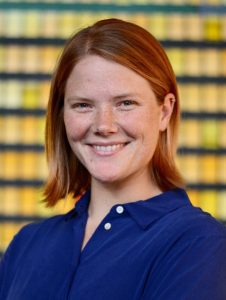February 09, 2022

When Sami Tellatin ’15 came to Mizzou, she knew she wanted to learn engineering skills she could apply to natural resources and land use. At Mizzou Engineering, she got so much more: hands-on opportunities, technical know-how and leadership skills she used to help start a business. Now, Tellatin has landed on the Forbes 30 under 30 list, a national roster of some of the brightest young minds in America.
Tellatin, Albert Abedi and Jayce Hafner are co-founders of FarmRaise, an app that helps farmers find and apply for federal grants. Tellatin and Abedi were included on the Forbes list for the company’s outstanding success in the finance category. Since it began in March 2020, the company has grown to include 420 premium clients and more than 8,000 farmers who take advantage of FarmRaise’s free services. The company has 13 employees and is currently hiring two software engineers to help expand services.
For Tellatin, it’s a labor of love.
“The biggest thing that motivates me is that our farmers are the stewards of our natural resource assets in this country,” she said. “They’re making decisions every day that impact soil, air, water, etc., and they rely on those resources for their livelihoods. They need to be empowered to make the best choices as they’re producing the things we all eat, use and rely on.”
Tellatin’s success is the culmination of numerous experiences, including working as a project coordinator for the North Central Sustainable Agriculture Research and Education program, a U.S. Department of Agriculture program administered through University of Missouri Extension, and masters’ programs in business and environment and resources at Stanford University.
But it was Mizzou Engineering that laid the foundation, she said.
“I didn’t know a thing about agriculture when I started at Mizzou in the biological engineering program,” she said. “The coolest thing was at Mizzou through the engineering program, I had broad exposure to science, math, critical thinking and problem solving.”
During her freshman year, she got a job hauling a thousand pounds of food waste each week from campus to a compost site at Bradford Research Farm. She was involved in Engineers Without Borders, which allowed her to work on cultivating plants for water purification in Honduras and took her to conferences in Washington, D.C., and Panama where she connected with other engineering leaders from across the country. She was part of Sustain Mizzou, the Mizzou Energy Action Coalition, and the alternative breaks program. She also conducted an independent study project researching pollution.
“There are so many opportunities at Mizzou — more than you can take advantage of,” she said. “Those opportunities helped me grow as a leader.”
Fundamental engineering skills such as problem solving, research and understanding operational decision making, have also proven key. Not only have they helped her make sense of how farmers make decisions based on various factors such as weather, soil type and equipment, but Tellatin said that background has also helped her run the operational side of the business.
“The engineers on our team joke with me that they see my engineering academic training,” she said. “I’m able to make decisions effectively, am organized and am analytical. I attribute that to my engineering background.”
That’s why Tellatin recommends a Mizzou Engineering education for anyone wanting to follow a similar leadership path.
“Getting an engineering degree positions someone to be a really strong interdisciplinary and entrepreneurial person,” she said. “And at Mizzou, you can think outside the box and get some dynamic experiences during your undergraduate education. I definitely recommend Mizzou Engineering.”